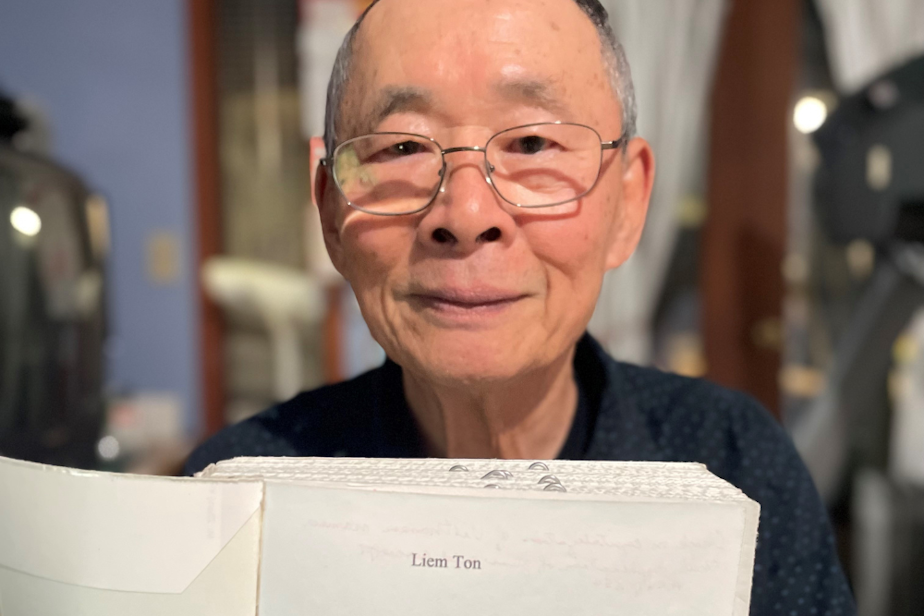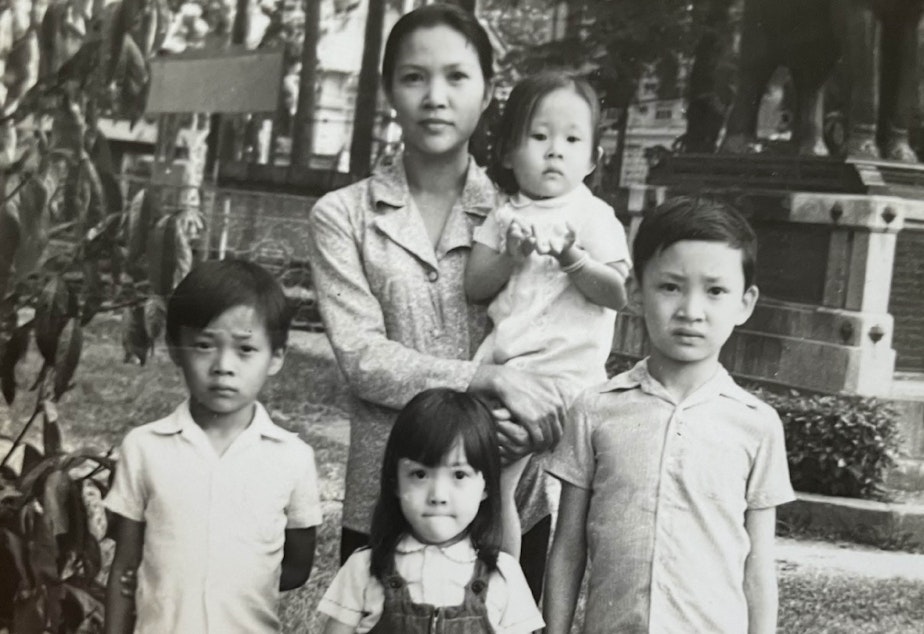My grandfather's 'Little Story': A journey through war and prison in Vietnam

Liem Ton embodies serenity. However, his life experiences weren’t always so peaceful.
His grandson, RadioActive’s Aaron Ton, shares his grandfather’s journey through war and prison in Vietnam.
[RadioActive Youth Media is KUOW’s radio journalism and audio storytelling program for young people. This story was entirely youth-produced, from the writing to the audio editing.]
I
’ve grown up in a safe neighborhood with a loving family, and I’ve been blessed with many opportunities. But how did I end up in such fortunate circumstances?
My grandparents and their children lived comfortably in Saigon, now called Ho Chi Minh City, in southern Vietnam. My grandfather, Liem Ton, worked for South Vietnam’s justice department as a criminal investigator, becoming a police captain as the Vietnam War escalated.
My grandmother, Lê Nguyen, raised their four children at home.
Sponsored
But everything changed on April 30, 1975.
That was the day when Saigon, South Vietnam’s capital, fell.
My grandparents remember the sounds of gunfire and planes overhead.
“Before the communists took over my country, my life is very happy," my grandmother said. "But when the communists took over Saigon — ah, it’s a nightmare.”
Sponsored
My grandfather was now a targeted enemy of the new regime because he was associated with the old government. He debated whether or not he should flee the country.
“How can I get those to the airport, to the boat? That is very risky, dangerous," he said. "So I stayed. Because if I stay home, they get only me. They leave my family alone, right? If I got away, they’d take my family.”
The “they” that my grandfather was referring to was the VietCong, North Vietnam’s communist guerilla force. When they came to his doorstep, he was ready to turn himself in.
“The guy said, ‘Let's go,’ so I followed him downstairs. And the guy with a rifle behind me, his rifle barrel touched my back.”
My grandfather said he was scared, yet calm, knowing that he was saving his wife and children’s lives by sacrificing his own.
Sponsored

He and the other prisoners were told that they’d be sent to a prison camp for 10 days.
“So we all think, '10 days is OK — we can go for 10 days,'" my grandfather said. "Actually, they have another idea: They’re gonna keep us for 10 days without food, without money.”
Meanwhile, my grandmother was left with the burden of taking care of their four children through financial struggle.
“My life was totally different," my grandmother said. "I lost everything — [my] job, and my husband go to prison. But they call it ‘education camp’. It sounds good, but it's not. It's like a prison.”
Sponsored
The four camps he survived were true sites of torture. Prisoners built their shelter with wood and bamboo. On top of that, they lived through poor health and unsanitary conditions.
“I was forced to work hard labor in the condition of malnutrition," my grandpa said. "In my case, I was forced to go up the mountains every day as a bamboo and firewood cutter for almost eight years.”
Finally, after four years without knowing if her husband was even alive, my grandmother was able to visit him.
“The first time I saw him ... he’s very sick, very pale, and looked like a different person," my grandmother said. "And when I come back, I cry a lot, to see him very sick like that. It’s not like my husband before. Before he’s so handsome and now he’s so ugly, and he’s like a skeleton. So terrible.”
My grandfather was released in 1982. Finding work as an enemy of the communist government was difficult. He was only allowed to work general labor, but it was too heavy for him. So he secretly developed photographs, which was dangerous because the new government disapproved of media created by associates of the old one.
Sponsored
“I got to give the security guy in my neighborhood something, so he looked away. So I can do that. So that I can afford the life of my family," my grandfather said.
Eventually, my grandparents and their children were able to flee to America and settle in Washington state. And that’s why I’m here today.
My grandfather has put his story on paper and I’m working with him to edit the book. It’s something I can do to show him my appreciation.
This story was produced in a RadioActive Youth Media introductory workshop for high school-age youth. Production assistance by Troy Landrum Jr. Edited by Casey Martin. Prepared for the web by Kelsey Kupferer.
Find RadioActive on Instagram, TikTok, YouTube and Facebook, and on the "RadioActive" podcast.
Support for KUOW's RadioActive comes from the Bill & Melinda Gates Foundation Discovery Center and BECU.



